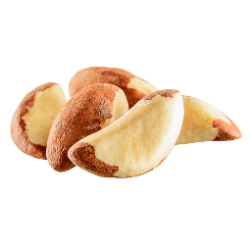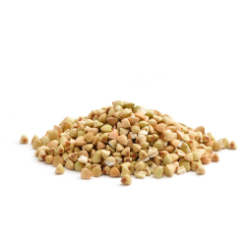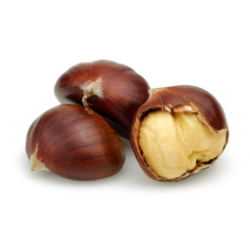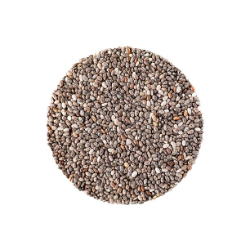Brazil nuts Nutrition facts
Brazil nuts

Amazon's dense forest holds some of the unique plant species like Brazil nuts, açaí berry., guarana, that can be found nowhere else on the planet earth. Botanically, brazil-nut tree belongs to the family of Lecythidaceae, in the genus: Bertholletia. Scientific name: Bertholletia excelsa.
Native Amazonians cherished these delicious nuts since ages, which provided them much-needed protein, fats, and other essential nutrients. Some of the common names in local dialects are castanha-do-pará, castania, para-nut, cream-nut, Castaña-de-Brazil (chestnuts of Brazil), etc.
Brazil nut trees are conspicuous in the non-flooded forests of Brazil, Bolivia, and Peru. They indeed are one of the tallest and long-living plant species among all the tropical rainforest flora. It grows up to 50 meters in height with a large erect stem and wide umbrella-like foliage canopy near its top 1/3. Its lifespan is about 500 to 700 years. In a season, a mature tree produces up to 300 fruit pods.
A brazil nut pod features a thick outer shell, as in coconut, and may weigh up to 2.5 kg in weight. It takes about 14 months for the fruit to mature after pollination. Mature pods are falling to the ground, usually with a heavy sound. It may remain intact even after falling from such a height!
In their natural habitat, brazil nut pods are exclusively dependent upon caviomorph rodents. Agoutis (Dasyprocta spp.) have the ability to gnaw open its woody shell to free and disperse leftover seeds for germination.
Inside, each fruit pod features 10-25 seeds (kernels) arranged in segments. Each kernel, in turn, is encased in its thick dark-brown thin shell. An edible white meat kernel features a triangular base with sloping sides. They have a sweet and nutty flavor. A nut weighs about 5 g.
Similar Food
-
 Almonds 579 Cal
Almonds 579 Cal -
 Buckwheat 343 Cal
Buckwheat 343 Cal -
 Cashew nut 553 Cal
Cashew nut 553 Cal -
 Chestnuts 213 Cal
Chestnuts 213 Cal -
 Chia seeds 486 Cal
Chia seeds 486 Cal
Source of Calorie
-
Carbs11.74 g 7%
-
Protein14.32 g 8%
-
Fat67.10 g 85%
How long to burn off 659 Calories?
*Approximate base minutes for a 25-year-old, 65 kg adult at moderate intensity.
| Nutrition Principle | Nutrition Value | Percentage of RDA |
|---|---|---|
| Principle | ||
| Energy | 659 Kcal | 33% |
| Carbohydrates | 11.74 g | 9% |
| Protein | 14.32 g | 26% |
| Total Fat | 67.10 g | 221% |
| Cholesterol | 0 mg | 0% |
| Dietary Fiber | 7.5 g | 20% |
| Vitamins | ||
| Folates | 22 μg | 5.5% |
| Niacin | 0.295 mg | 2% |
| Pantothenic acid | 0.184 mg | 3.5% |
| Pyridoxine | 0.101 mg | 8% |
| Riboflavin | 0.035 mg | 3% |
| Thiamin | 0.617 mg | 51% |
| Vitamin A | 0 IU | 0% |
| Vitamin C | 0.7 μg | 1% |
| Vitamin E-γ | 7.87 mg | 52% |
| Electrolytes | ||
| Sodium | 2 mg | 0% |
| Potassium | 597 mg | 13% |
| Minerals | ||
| Calcium | 160 mg | 16% |
| Copper | 1.743 mg | 194% |
| Iron | 2.43 mg | 30% |
| Magnesium | 376 mg | 94% |
| Manganese | 1.223 mg | 53% |
| Phosphorus | 725 mg | 103% |
| Selenium | 1917 mcg | 3485% |
| Zinc | 4.06 mg | 36% |
| Phyto-nutrients | ||
| Carotene-ß | 0 mcg | -- |
| Crypto-xanthin-ß | 0 μg | -- |
| Lutein-zeaxanthin | 0 μg | -- |